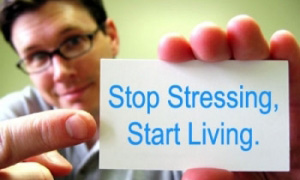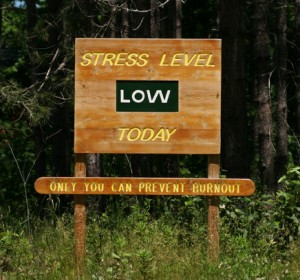 Aha! Based on the title, I bet you thought this article would be about weight loss, didn’t you? Although weight loss is a favorite health topic regardless of the season, stress, like excess weight, is also a heavy burden that can make us feel unhappy and unhealthy. The dark days of winter don’t make it any easier and eating poorly or not exercising also contributes to feelings of stress. But, is stress bad for you? Yes and no. Let’s explore that question and answer a little further, and talk about how, and why, you should “lighten your load” for better health.
Aha! Based on the title, I bet you thought this article would be about weight loss, didn’t you? Although weight loss is a favorite health topic regardless of the season, stress, like excess weight, is also a heavy burden that can make us feel unhappy and unhealthy. The dark days of winter don’t make it any easier and eating poorly or not exercising also contributes to feelings of stress. But, is stress bad for you? Yes and no. Let’s explore that question and answer a little further, and talk about how, and why, you should “lighten your load” for better health.
When a person experiences a stressor, whether it’s being mugged in a park, spending a day hauling a load from one place to another, or getting married, there are chemicals in the blood called hormones that respond. These hormones are truly necessary for our survival (even happy events can be stressful). We react by “fight or flight” when stressed in a particular way, especially if threatened. Back in the days when ancient wolves or alligators were out to get the hunters and gatherers trying to put a meal on the table, those same stress hormones allowed the hunter/gatherer to run away to safety or stay and wrestle the predator.
Adrenaline, one type of stress hormone, works by making your heart beat faster, raising your blood pressure and opening up your lungs, sending more blood and oxygen to your heart, brain and lungs so you can flee or fight. Another hormone, cortisol, makes sure that there is enough sugar floating around in your blood for the energy one would need to fight or flee. The brain needs more sugar to think straight in a stressful situation, and it also helps with memory. Another function of cortisol, at least initially, is to work with the immune system, so we are less likely to get infections. So, while these stress hormones keep us alive in times of severe threat, long-term stress can harm your body and your mind.
 Nowadays, most of us are not fighting or fleeing from predators or Attila the Hun, but it doesn’t mean we don’t experience stress. As the body perceives chronic stress, it continues to pump out stress hormones, making sure your blood pressure is high and there is always sugar floating around. Over time, high blood pressure can cause strokes, heart attacks and kidney disease. When excessive levels of cortisol are swishing around in your blood stream, instead of protecting you from infection and cancers, it makes it easier to get sick from those things. When blood sugar levels are high from too much cortisol, not to mention when we eat too much, a person is much more likely to get diabetes. Left uncontrolled, diabetes damages the heart, kidneys, eyes, blood vessels and nerves, even causing death.
Nowadays, most of us are not fighting or fleeing from predators or Attila the Hun, but it doesn’t mean we don’t experience stress. As the body perceives chronic stress, it continues to pump out stress hormones, making sure your blood pressure is high and there is always sugar floating around. Over time, high blood pressure can cause strokes, heart attacks and kidney disease. When excessive levels of cortisol are swishing around in your blood stream, instead of protecting you from infection and cancers, it makes it easier to get sick from those things. When blood sugar levels are high from too much cortisol, not to mention when we eat too much, a person is much more likely to get diabetes. Left uncontrolled, diabetes damages the heart, kidneys, eyes, blood vessels and nerves, even causing death.
Lowering your stress levels will make you healthier and happier, but how do you do it? Most of us in this modern age of having to work harder with fewer resources, having to be somewhere 20 minutes ago and being careful not to get into trouble with the boss, are suffering from chronic stress. Some of us are dealing with even worse things – home foreclosures, unemployment, illness, etc. But, think of someone you know who seems to take life in stride – someone who never seems to be stressed out. That person is probably someone who has “decided” to limit their reaction to stress. Unless we are consciously thinking about how to balance the amount of stress we have, we will be victims of our own hormones.
Stress creates anxiety much of the time, causing us to have feelings of worry about things we often can’t do anything about. What’s the point in worrying about things if there is really nothing you can do to change them? As the quote goes, “Worry is like a rocking chair – it gives you something to do, but it gets you nowhere.” Some people have uncontrollable worry and anxiety related to their stress, or perhaps causing their stress, and should speak with some sort of a mental health professional, like a psychologist or psychiatric nurse practitioner.
 Following are four things we all can do to help alleviate stress in our lives, and therefore its negative health consequences. These things don’t cost much to do (if anything) and it is so much better to prevent the unhealthy outcomes from stress than to treat them later on in life.
Following are four things we all can do to help alleviate stress in our lives, and therefore its negative health consequences. These things don’t cost much to do (if anything) and it is so much better to prevent the unhealthy outcomes from stress than to treat them later on in life.
Deep Breathing – this is free. You can do it anywhere and you don’t need any expensive equipment. There is no right or wrong way to do it, although doing it slowly is a key component. We naturally breathe faster when we are stressed, so doing slow, deep breathing, can counteract that stressful breathing, making us feel more relaxed. Some people like to focus on breathing in through the nose and out through the mouth.
Laugh – I just can’t say enough about laughing as a tool for health! It has so many benefits, not the least of which is helping to reduce the flow of stress hormones in your blood stream. Laughing ultimately lowers blood pressure and heart rate and helps keep your arteries from getting clogged. It helps to produce endorphins, natural substances similar to morphine and heroin, that makes us feel calmer and more serene. You could listen to comedy CDs on the road, watch comedy shows on television, or even go to a comedy club if there is one nearby. I know it seems goofy, but that’s the point – it’s funny and fun and you’ll feel great after laughing a lot.
Meditation – this is a way of relaxing that involves clearing your mind (you can focus on a sound or nothing at all). It takes a little practice. Some people feel that prayer is a way of meditating, while others like to repeat the same thing over and over again in their head. Again, it costs nothing and there are no side effects from doing it.
Exercise – most people, even those who dread doing exercise, feel better and more relaxed after they do it. And it doesn’t have to be running a marathon – it can be something as simple as walking for 10 or 15 minutes. Just be careful not to do exercise too close to the time that you should be going to sleep, which can make you feel even more awake and ready to keep going rather than drifting off to sleepyland.
If you are stressed out, try some of these things to lighten your load. Stress will hurt you over the long haul, so quit doing it. Like that popular book by Richard Carlson suggests, don’t sweat the small stuff. Relieving stress will not only make you feel better, but it could save your life!
